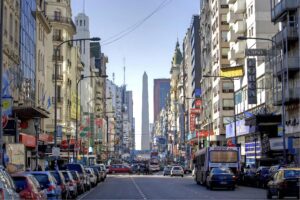Investing in USD from Argentina has become a preferred strategy for preserving wealth amid currency controls and high inflation, with the Argentine peso losing over 90% of its value in the past decade.
Argentines can access dollars through official exchange markets, investment accounts, or offshore strategies to protect savings from devaluation.
This guide walks you through:
- Are there currency controls in Argentina now?
- Can you have a USD account in Argentina?
- How to invest in USD from Argentina
- What are the risks of investing in Argentina in USD?
- What are the benefits of investing in USD from Argentina?
My contact details are hello@adamfayed.com and WhatsApp +44-7393-450-837 if you have any questions.
The information in this article is for general guidance only. It does not constitute financial, legal, or tax advice, and is not a recommendation or solicitation to invest. Some facts may have changed since the time of writing.

What Is the Best Way to Get USD in Argentina?
With the lifting of strict currency controls (known as cepo cambiario) in April 2025, Argentinians can now buy US dollars more easily through official channels without cumbersome restrictions or waiting periods.
This reform has significantly reduced reliance on the black market for dollars.
Why Invest in USD from Argentina?
Argentina has faced decades of economic volatility, hyperinflation, and currency depreciation, making the US dollar a reliable store of value.
With inflation rates often exceeding 100% annually and the peso losing over 90% of its value in the last decade, USD investments provide a hedge against further devaluation and offer access to global financial markets.
How Do I Invest in USD from Argentina?
Argentinians can invest in USD through banks, brokerages, ADRs, ETFs, and even stablecoins. Here are the main options:
1. Buy USD Through Official Channels
After the removal of Argentina’s stringent currency controls, citizens can now purchase US dollars through banks and bona fide exchange markets without facing previous restrictions.
This provides a safer and more transparent route compared to the blue dollar black-market rates.
2. Invest in US Securities via Regulated Brokers
You can invest in US assets (stocks, ETFs, bonds) through international platforms, which offer global market access, sophisticated tools, and competitive pricing.
3. Access ADRs and Global ETFs
Another straightforward option is purchasing American Depositary Receipts (ADRs) or global ETFs like the Global X MSCI Argentina ETF (ARGT), giving exposure to US and Argentine markets in USD.
These instruments can be accessed through international brokerages like Schwab or IB.
4. Use Stablecoins and Digital Dollar Wallets
Platforms like Bitso, popular across Latin America, enable you to buy and hold dollar-pegged assets like USDC.
Bitso also recently introduced a feature allowing users to create US virtual accounts, receive USD via ACH/wire transfers, and hold or earn yields in digital dollars.
Legal and Regulatory Considerations for Argentina USD Investment
Following the April 2025 reforms that eased currency restrictions, Argentinians can now legally purchase and hold USD through official exchange channels and authorized financial institutions.
However, investors must still comply with:
- Tax Reporting – Declare foreign-held assets to AFIP (Argentina’s tax authority).
- Transaction Limits – While restrictions are eased, high-volume transfers may still trigger additional scrutiny.
- Offshore Investment Compliance – Some brokers require proof of funds and residency status to open accounts.
Opening an Offshore Brokerage or Bank Account for Argentina USD Investment
Many Argentinians choose to open accounts abroad particularly in the US, Switzerland, or Uruguay for greater investment flexibility.
Offshore accounts provide access to a wider range of financial products, though they require higher compliance standards and initial deposits.
Popular jurisdictions include:
- United States – Offers access to a wide range of US securities, ETFs, and bonds through brokers. Banking in the US also provides strong regulatory protection and direct USD access.
- Switzerland – Known for its banking stability, high privacy standards, and wealth management expertise, though minimum deposit requirements often start at USD 250,000 or more.
- Uruguay – A regional favorite due to geographic proximity, economic stability, and relatively accessible banking requirements compared to European institutions.
Benefits of Investing in USD from Argentina

Investing in US dollars from Argentina helps protect savings from inflation, gives access to global markets, and offers stability, liquidity, and flexible channels for holding wealth.
- Hedge Against Inflation and Peso Devaluation
With Argentina’s inflation frequently exceeding 100% and the peso losing significant value over the past decade, holding USD provides a reliable store of value. Dollars maintain purchasing power better than local currency, helping protect savings from erosion.
- Access to Global Financial Markets
USD investments allow Argentinians to participate in US and international markets, including stocks, ETFs, bonds, and ADRs. This exposure provides greater diversification and the potential for higher returns compared to local investment options.
- Stability and Liquidity
The US dollar is one of the world’s most stable currencies, widely accepted internationally. USD-denominated assets are generally highly liquid, meaning investors can convert them back into pesos or other currencies relatively easily when needed.
- Flexibility Through Multiple Investment Channels
Investors can access USD via banks, regulated brokerages, offshore accounts, or digital platforms like Bitso. This variety of channels provides flexibility in managing, growing, and securing funds according to personal risk tolerance and investment goals.
- Protection Against Capital Controls
Even if Argentina reintroduces currency restrictions, holding USD offshore or through digital platforms helps investors maintain control over their funds, bypassing local limitations on cash withdrawals or foreign currency purchases.
- Family and Estate Planning Benefits
USD investments can also be structured to support long-term financial planning, including wealth transfer, inheritance strategies, or saving for education abroad, giving families a safeguard against domestic economic volatility.
Risks of Investing in USD from Argentina
The main risks of investing in USD from Argentina include shifting currency policies, worldwide tax obligations, counterparty risks with brokers or platforms, and evolving crypto regulations.
- Currency Policy Shifts
Argentina has a long history of implementing strict currency controls, such as limits on dollar purchases and taxes on foreign transactions. While recent reforms have loosened restrictions, future governments could reinstate measures that make USD access more difficult or costly.
- Tax Implications
Argentina taxes its residents on worldwide income, meaning earnings from USD investments held offshore or through foreign brokers are subject to taxation. Failure to declare these assets can lead to penalties, audits, and legal complications.
- Counterparty & Platform Risk
Using international brokers, fintech platforms, or digital wallets introduces counterparty risk. If a platform lacks proper regulation or financial backing, funds could be at risk in the event of insolvency or operational failure. Only licensed and reputable service providers should be used.
- Regulatory Crackdowns on Crypto
Stablecoins and digital wallets provide quick access to USD, but regulations around crypto remain fluid. Stricter rules could limit usage or impose reporting obligations, impacting liquidity and transaction flexibility.
Tips for Safe USD Investment from Argentina
- Diversify Across Multiple Instruments. Relying on a single asset class can expose investors to unnecessary risk. Combining USD-denominated stocks, ETFs, ADRs, and even regulated digital assets helps spread exposure and reduce potential losses from market volatility or regulatory shifts.
- Use Only Regulated Brokers and Licensed Financial Entities. Choosing well-established international brokers or financial institutions ensures compliance with global standards. Platforms registered with entities such as the US Securities and Exchange Commission (SEC) or equivalent regulators provide stronger investor protection.
- Stay Updated on Argentina’s Currency and Tax Regulations. Changes in foreign exchange policies, crypto regulations, or tax rules can directly affect how and where you can invest. Monitoring Central Bank announcements and updates from Argentina’s tax authority (AFIP) is essential to maintain compliance.
- Consider Professional Financial Advice for Cross-Border Tax Planning. Since Argentina taxes worldwide income and mandates reporting of offshore assets, consulting with a financial advisor or tax specialist can help optimize investment structures, reduce liabilities, and avoid costly penalties.
Conclusion
Investing in USD from Argentina offers a practical hedge against inflation and peso devaluation while providing access to global financial markets.
With multiple legal channels from banks and regulated brokers to offshore accounts and digital platforms, investors can tailor strategies to their risk tolerance and financial goals.
Careful planning, compliance with tax and currency regulations, and diversified investment choices are key to safely preserving and growing wealth in USD.
FAQs
Can I open a US brokerage account from Argentina?
Yes. Argentinians can open accounts with brokers like Interactive Brokers or Charles Schwab International, though proof of identity, residency, and source of funds is required for compliance with international regulations.
Do I need to report USD investments to AFIP?
Yes. Argentina taxes residents on worldwide income, so all offshore holdings including US brokerage accounts or USD investments must be declared to AFIP to avoid penalties.
Are there limits on how much USD I can buy?
Legally, there are no strict limits following the April 2025 currency reforms.
However, banks may impose practical limits, and large transactions could trigger additional reporting or scrutiny by AFIP.
Pained by financial indecision?

Adam is an internationally recognised author on financial matters with over 830million answer views on Quora, a widely sold book on Amazon, and a contributor on Forbes.



